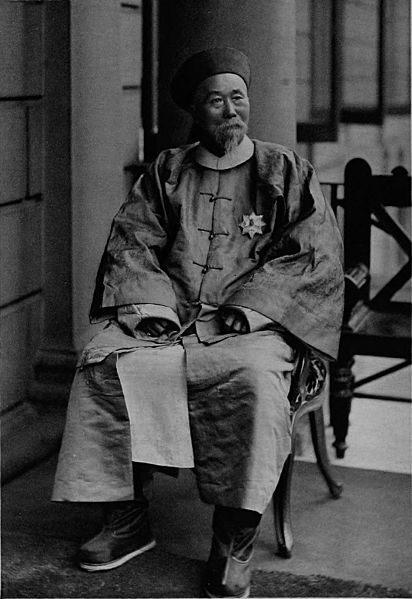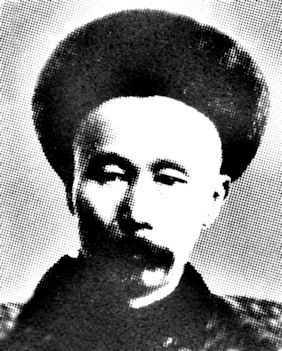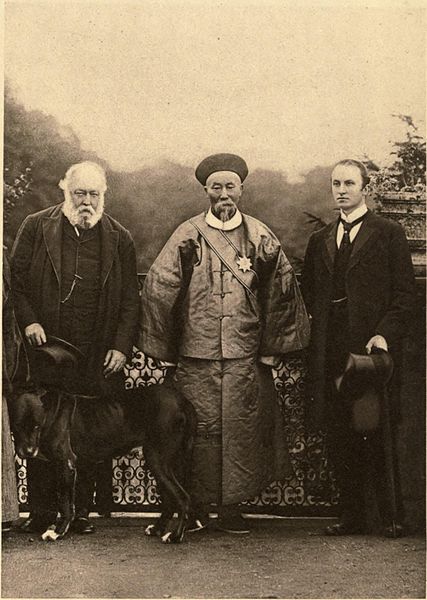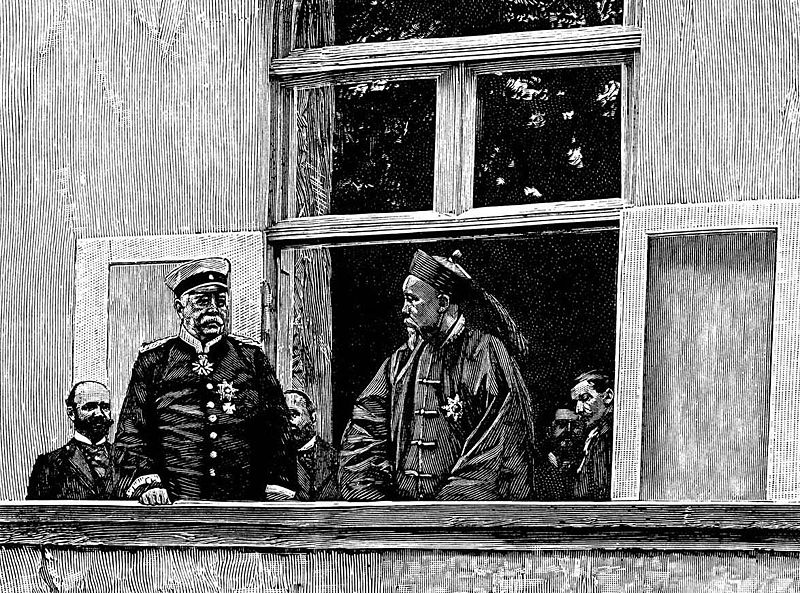<Back to Index>
- Viceroy of Zhili and Minister of Beiyang Li Hongzhang, 1823
PAGE SPONSOR



Li Hongzhang (simplified Chinese: 李鸿章; traditional Chinese: 李鴻章), GCVO, (February 15, 1823 – November 7, 1901) was a leading statesman of the late Qing Empire. He quelled several major rebellions and served in important positions of the Imperial Court, including the premier viceroyalty of Zhili.
Although he was best known in the West for his generally pro-modern stance and importance as a negotiator, Li antagonized the British with his support of Russia as a foil against Japanese expansionism in Manchuria and fell from favor with the Chinese after their loss in the 1894 Sino - Japanese War. His image in China remains controversial, with criticism on one hand for political and military mistakes and praise on the other for his success against the Taiping Rebellion, his diplomatic skills defending Chinese interests in the era of unequal treaties, and his role pioneering China's industrial and military modernization. For his life's work, the British Queen Victoria made him a Knight Grand Cross of the Royal Victorian Order.
Li Hongzhang was born in the village of Qunzhi (Chinese: 群治村) in Modian township (Chinese: 磨店鄉), 14 kilometers (8.7 mi) northeast of central Hefei, now the capital of Anhui province. From very early in life, he showed remarkable ability, and he became a shengyuan in the imperial examination system. In 1847, he obtained jinshi degree, the highest level in the Imperial examination system. Two years later he gained admittance into the Hanlin Academy. Shortly after this the central provinces of the Empire were invaded by the Taiping rebels, and in defense of his native district he raised a regiment of militia. His service to the imperial cause attracted the attention of Zeng Guofan, the generalissimo in command.
In 1859, Li was transferred to the province of Fujian, where he was given the rank of taotai, or attendant of circuit. At Zeng's request, he fought the rebels. He formed an army called the Waigun (淮軍). He found his cause supported by the "Ever Victorious Army", which, having been raised by an American named Frederick Townsend Ward, was placed under the command of Charles George Gordon. With this support Li gained numerous victories leading to the surrender of Suzhou. For these exploits, he was made governor of Jiangsu, was decorated with an imperial yellow jacket, and was ennobled as an earl.
An incident connected with the surrender of Suzhou soured Li's relationship with Gordon. By an arrangement with Gordon, the rebel princes yielded Nanjing on condition that their lives should be spared. In spite of the agreement, Li ordered their instant execution. This breach of faith so infuriated Gordon that he seized a rifle, intending to shoot the falsifier of his word, and would have done so had Li not fled. On the suppression of the rebellion (1864), Li took up his duties as governor, but was not long allowed to remain in civil life. On the outbreak of the Nian Rebellion in Henan and Shandong (1866), he was ordered again to take to the field, and after some misadventures, he succeeded in suppressing the movement. A year later, he was appointed viceroy of Huguang, where he remained until 1870, when the Tianjin Massacre necessitated his transfer to the scene of the outrage. He was appointed to the viceroyalty of the metropolitan province of Zhili, and justified his appointment by the energy with which he suppressed all attempts to keep alive the anti - foreign sentiment among the people. For his services, he was made imperial tutor and member of the grand council of the Empire, and was decorated with many - eyed peacocks' feathers.
To his duties as viceroy were added those of the Superintendent of Trade, and from that time until his death, with a few intervals of retirement, he directed the foreign policy of China. He concluded the Chefoo Convention with Sir Thomas Wade (1876), and thus ended the difficulty caused by the murder of Mr. Margary in Yunnan; he arranged treaties with Peru and the Convention of Tientsin with Japan, and he directed the Chinese policy in Korea.
On the death of the Tongzhi Emperor in 1875, he introduced a large armed force into the capital and effected a coup d'etat which placed the Guangxu Emperor on the throne under the tutelage of the two dowager empresses. In 1886, on the conclusion of the Sino - French War, he arranged a treaty with France. Li was impressed with the necessity of strengthening the empire, and while Viceroy of Zhili he raised a large well drilled and well armed force, and spent vast sums both in fortifying Port Arthur and the Taku forts and in increasing the navy. For years, he had watched the successful reforms effected in the Empire of Japan and had a well founded dread of coming into conflict with that nation.
In 1885 Li founded the Tianjin Military Academy for Chinese army officers, with German advisers, as part of his military reforms. The move was supported by Anhui Army commander Zhou Shengchuan. The academy was to serve Anhui Army and Green Standard Army officers. Various practical military, mathematics and science subjects were taught at the academy. The instructors were German officers. Another program was started at the academy for five years in 1887 to train teenagers as new army officers. Mathematics, practical and technical subjects, sciences, foreign languages, Chinese Classics and history were taught at the school. Exams were administered to students. The instruction for Tianjin Military Academy was copied at the Weihaiwei and Shanhaiguan military schools. The 'maritime defense fund' supplied the budget for the Tianjin Military Academy, which was shared with the Tianjin Naval Academy.
Because of his prominent role in Chinese diplomacy in Korea and of his strong political connections in Manchuria, Li Hongzhang found himself leading Chinese forces during the disastrous Sino - Japanese War. In fact, it was mostly the armies that he established and controlled that did the fighting, whereas other Chinese troops led by his rivals and political enemies did not come to their aid. Rampant corruption in the army further weakened China's military. For instance, one official misappropriated ammunition funds for personal use. As a result, shells ran out for some of the warships during battle, forcing one navy commander, Deng Shichang, to resort to ramming the enemies' ship. The defeat of his modernized troops and a small naval force at the hands of the Japanese undermined his political standing, as well as the wider cause of the Self - Strengthening Movement. Li paid a personal price for China's defeat, while signing the Treaty of Shimonoseki ending the war: a Japanese assassin fired at him and wounded him below the left eye. Due to the diplomatic loss of face, Japan agreed to the immediate ceasefire Li had urged in the days before the incident.
In 1896, he attended the coronation of Emperor Nicholas II of Russia on behalf of the Qing Government and toured Europe and the United States of America, where he advocated reform of the American immigration policies that had greatly restricted Chinese immigration after the Chinese Exclusion Act of 1882 (renewed in 1892). (He also witnessed the 1896 Royal Naval Fleet Review at Spithead.) It was during his visit to Britain in 1896 that Queen Victoria made him a Knight Grand Cross of the Royal Victorian Order.
Li Hongzhang played a major role in ending the Boxer Rebellion. His early position was that the Qing Dynasty was making a mistake by supporting the Boxers against the foreign forces. He wrote to Empress Dowager Cixi:
My blood runs cold at the thought of events to come. (...) Under an enlightened sovereign these Boxers, with their ridiculous claims of supernatural powers, would most assuredly have been condemned to death long since... your Majesties... are still in the hands of traitors, regarding these Boxers as your dutiful subjects, with the result that unrest is spreading and alarm universal.
Li Hongzhang also totally refused to listen to orders from the government for more troops when they were needed to fight against the foreigners, which he had available, derailing the Chinese war effort.
Li Hongzhang used the Siege of the International Legations (Boxer Rebellion) as a political weapon against his rivals in Beijing, since he controlled the Chinese Telegraph service, he exaggerated and lied, claiming that Chinese forces committed atrocities and murder upon the foreigners and exterminated all of them. This information was sent to the western world. He aimed to infuriate the Europeans against the Chinese forces in Beijing, and succeeded in spreading massive amounts of false information.
For refusing to obey the Chinese government's orders and not sending his own troops to help the Chinese army at all during the Boxer Rebellion, Li Hongzhang was praised by the westerners.
The last picture ever made of the Viceroy Li Hongzhang was taken with Louis Livingston Seaman on February 22, 1900, in his private chamber at his palace in Peking.
In 1901, as his last task for the Qing Dynasty, he was the principal Chinese negotiator with the foreign powers who had captured Beijing, and, on September 7, 1901, he signed the treaty (Boxer Protocol) ending the Boxer crisis, obtaining the departure of the foreign armies at the price of huge indemnities for China. Exhausted from the negotiations, he died from liver inflammation two months later at Shenlian Temple in Beijing. Guangxu created him the title Marquis Suyi of the First Class (一等肅毅候). After his death, this Peerage was inherited by his grandson Li Guojie.
Since the First Sino - Japanese War, Li Hongzhang has been a target of criticism and was portrayed in many ways as a traitor to the Chinese people, an infamous name that lives in history. In communist China this negative verdict is echoed through history textbooks and other media until today.
The Chinese navy had been eliminated in August 1884 at the Battle of Foochow, In July 1885, Li signed the Sino - French treaty to confirm the Treaty of Hué accepting conditions that did not reflect the decisive victory of the Chinese army in the Battle of Bang Bo in March 1885, which brought about the fall of the Jules Ferry government in France.
Li recognized talent, he hired a British officer Col. Charles Gordon to lead the Ever Victorious Army to quell the Taiping Rebellion. For the first time in Chinese history there was a foreign military general. He hired an American educator Charles D. Tenney as tutor to teach his children western science. His descendants remain as diplomats after the Manchu Dynasty. He enjoyed western science and hired Guxtac Detering (1842 – 1913) and William N. Pethick. He started the custom, postal systems by appointment of Sir Robert Hart.
Sergei Witte dismissed some claims that Li was bribed to sign the railway protocol.
